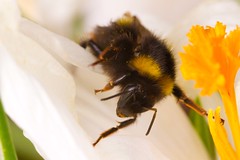
Oh boy! Summertime has arrived. Time for fun, vacations, cook outs, and yes – the bites, stings of insects and spiders. Although mosquito bites are irritating and spider bites often stingy and itchy, the most common stings of concern are those from bees.
Why? Because they hurt, and they can lead to development of allergic responses from the host whom they bite. No one is born with an allergy to bee stings. It takes exposure- and that occurs when the bee stings – bee venom is injected and the body identifies it as a foreign – an enemy and begins to set up an army against it, called antibodies. The first few stings give the exposure needed and then the body manufactures the antibodies which are stored away but rapidly deseminated as more exposure occurs
Somatic reaction is always bee species specific- one is allergic to only that bee specific sub group.
Workers for the same bees will return to the same location every summer either because of the abundant food sources (flowers) or because of the hive they built. They will find the old hive, remodel it and set up house keeping. So one sensitized to these bees a previous summer may be at risk for scary reactions. Sensitization occurs by repeated stings (playing in the area of the hive everyday) or by one big exposure, bee hive falling on one’s head- which by the way happened to me a few summers ago. Bee keepers are at a particular risk.
The body can react to as simple as a reaction to a red welt at the site of the bite to hives all over to more serious reactions with wheezing, heart racing, tongue swelling, difficulty breathing, or cardiovascular collapse, The more times exposure occurs, the more serious the reaction can be as the body is set to attack the enemy!
If you are in the group of people who have begun to develop more total body reactions, you should be prepared and consult with your physician to provide you with an Epifer kit. It includes 2 auto injectables, pens of .3 mg of ephifren 1:1000 dilution which will counteract too serious body responses. The kit is expensive usually at least part covered by insurance- but is life saving. You should bring it to all outside events, camping hiking, bike riding. And you should have someone close to you who is capable of administering the shot if you are to sick.
Remember too as a prevention almost all bees stay out of defenses of their food source, their hive, and their queen. If you are working with a flower bed when the bees are collecting nectar just change your location they won’t . If indeed these bees have built their nest in an undesirable location one should contact their county exchange and request who can move or relocate the hive to a better location.
Bees are a invaluable to our environment for pollination of flowers of crops, tress and the manufacturing of honey for food and medication. Honor them, respect them and don’t mess with them.
Happy Summer!
Jayne Croghan MD